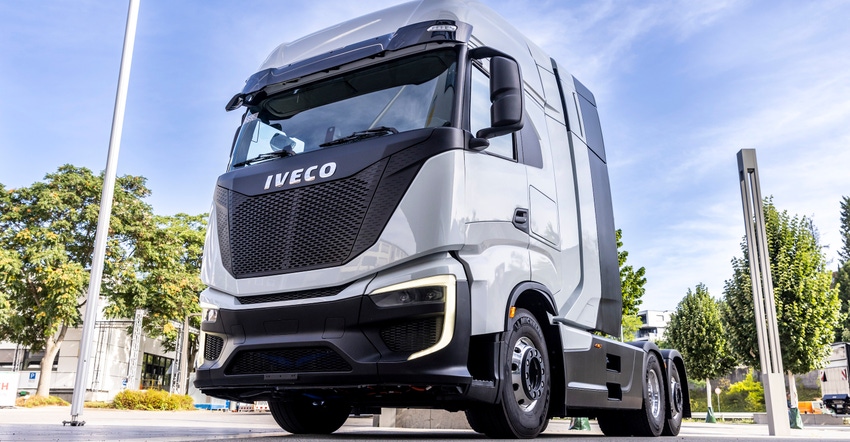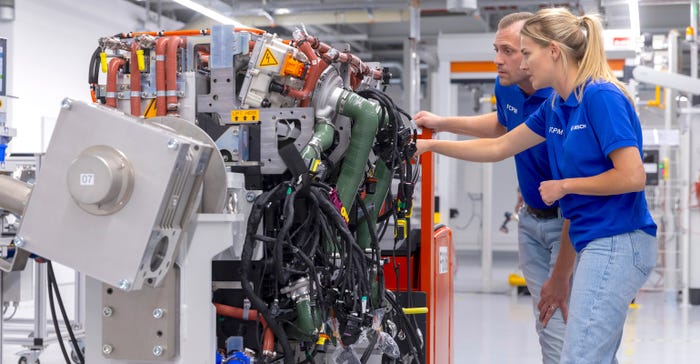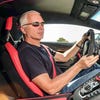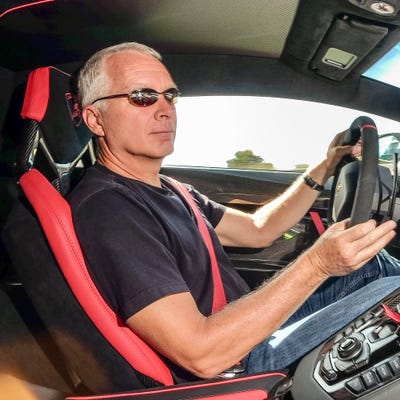Bosch Initiates Fuel Cell Production for Commercial Trucks
The Nikola-Iveco Class 8 highway tractor is Bosch’s first customer for complete fuel cell power systems.

While there has been drama concerning the rocky launch of Nikola Corp.’s fuel cell-powered Class 8 highway truck, the company’s fuel cell supplier, Bosch, is on schedule with the truck’s power source.
Bosch is not only building the hydrogen fuel cells for the trucks in its Feuerbach factory, it is also building many of the components used to build the cells, avoiding reliance on other suppliers. For example, the Bosch plant in Bamberg, Germany supplies the fuel cell stack that combines hydrogen and oxygen to make electric power for the vehicle’s motor.
Other system components such as the electric air compressor and the recirculation blower come from Bosch’s plant in Homburg, Germany. “Bosch is one of the very few companies that are capable of mass-producing technology as complex as fuel-cell stacks,” said Markus Heyn, member of the Bosch board of management and chairman of Bosch Mobility.
“We don’t just have the required systems expertise, but also the capability of quickly scaling up new developments to mass production,” he said. In addition to the Feuerbach plant, Bosch will build cells for the Chinese market in Chongqing, China.
At the Stuttgart, Germany announcement for the launch of production, Heyn pointed to Bosch’s 2.5 billion Euro investment in the development and manufacturing of hydrogen fuel technologies between 2021 and 2026, with two-thirds of that expenditure going specifically to fuel cell production. By 2030, the company forecasts that 20 percent of new trucks six tons or larger will be fuel cell powered.
“Our business opportunities are enormous, and the effects of this entry into the hydrogen economy on jobs are no less important,” Heyn said. “Even now, we have more than 3,000 people at Bosch working on hydrogen technologies, more than half of them in Europe.”

Significantly, the company plans to fill the new fuel cell jobs with workers who currently build combustion-related products that will phase out over time. “We can fill most of the vacancies arising in the emerging hydrogen business from within the company, and especially with people who have so far worked in our powertrain business,” said Heyn. “More than that, we can transfer expertise from one area to the other.”
That’s because many of the skills needed for making Bosch’s combustion-related products, such as fuel injectors, are transferrable to fuel cell manufacturing. “For example, laser welding is something we are familiar with from injector production,” he said. “And whether in coating technology or leak testing, a technology transfer is possible.”
In the example of high-speed laser welding, Bosch makes 1,200 meters of welds in each stack of mobile fuel-cell systems that are hydrogen-tight. “This is a process that only exists at Bosch,” Heyn claimed. On the matter of laser drilling, Bosch makes more than 200 million holes – 6,000 a second – in each stack of its stationary fuel-cell system.
Q&A With Bosch President on the Migration to EVs
Additionally, the company is well-positioned to integrate complex components into a complete system thanks to Bosch’s experience with sensor technology and complex electronics, Heyn stated. This is why Bosch will succeed in the fuel cell market, he added. “Plenty of companies can build electrolysis stacks in the laboratory, but only very few are capable of mass producing such stacks.”
Bosch’s longstanding know-how in manufacturing such complex products has led the company to prefer to make as many of the components that go into the final product. “This is the reason why we manufacture so much in-house,” said Heyn. “Over the long term as well, we want more than half of the fuel cell powertrain by value to be created internally. Not least, this also involves our traditional strength in making special-purpose machinery. This means we can cover more than 50 percent of the manufacturing equipment we need.”
In addition to the Nikola Iveco truck that Bosch showed with its fuel cell at the announcement, the company says it has orders from three other truck makers for complete fuel cell power systems and additional orders for fuel cell components such as the fuel cell stack, the hydrogen metering valve, and the electric air compressor that pushes air through the stack.
The combined output of Bosch’s Bamberg and Wuxi plants will reach one gigawatt of fuel cell power by the mid-2020s, Heyn said, with an initial production volume of several thousand systems each year.
About the Author(s)
You May Also Like


.jpg?width=300&auto=webp&quality=80&disable=upscale)


